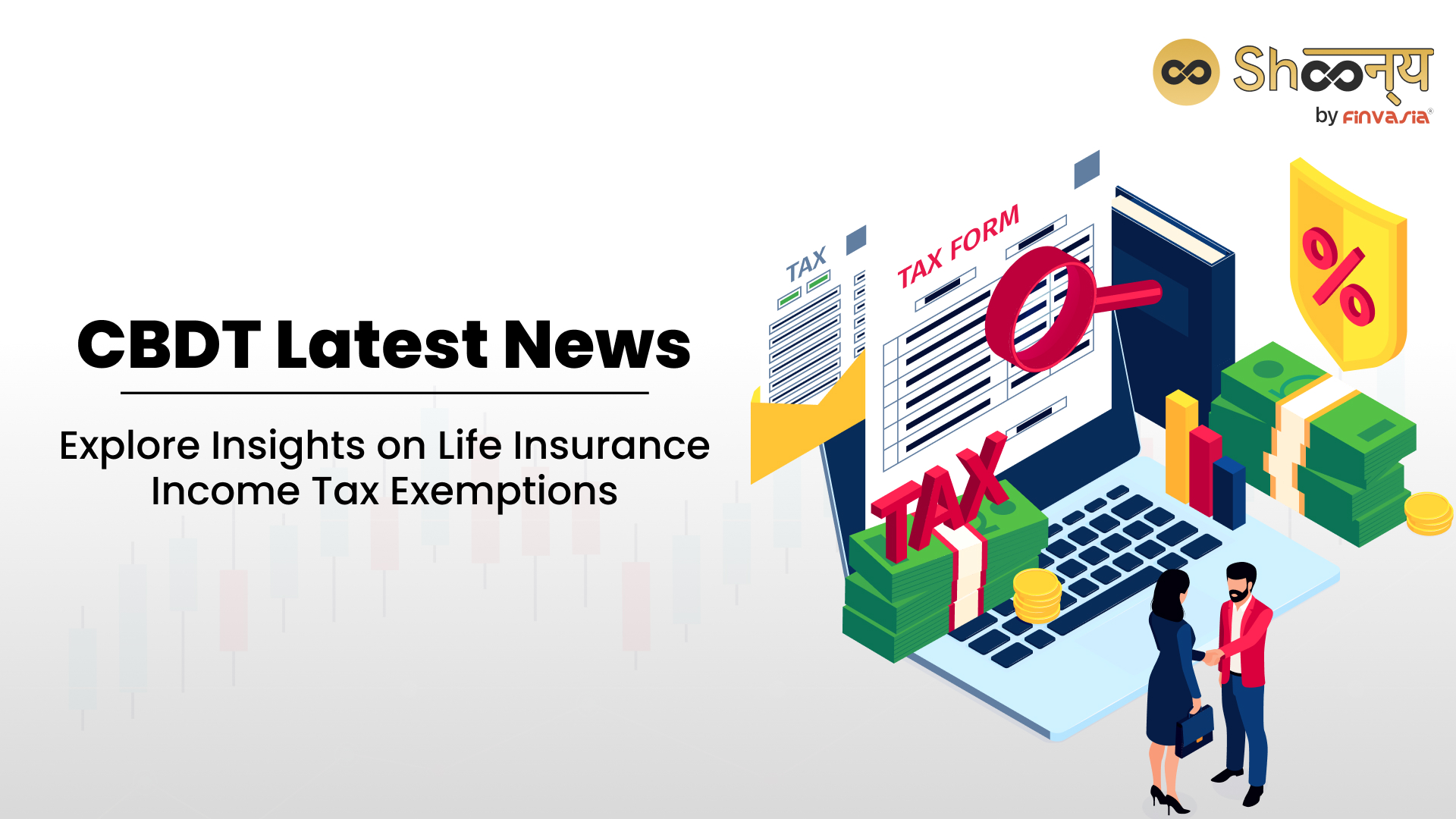CBDT Latest News on Income Tax – Issues Fresh Guidelines on Life Insurance Tax Exemptions

In a significant stride towards redefining the taxation landscape, the Central Board of Direct Taxes (CBDT) has unveiled fresh guidelines under section 10D of the Income-Tax Act, 1961. As per the CBDT’s latest news on income tax, these guidelines, issued through the latest CBDT circular on August 16, 2023, notifying changes to clause (10D) of section 10 of the Income-Tax Act, 1961, build upon the amendments introduced by the Finance Act of 2023. Together, these developments carry far-reaching implications, poised to reshape our understanding of tax exemptions within the realm of life insurance. This detailed guide aims to explore these big changes carefully, showing how the latest ones have a strong effect and explaining the income tax exemptions.
CBDT Latest News on Income Tax- Key highlights
- Fresh CBDT guidelines under section 10D redefine taxation in life insurance.
- Amendments from Finance Act 2023 impact exemptions, reshaping understanding.
- Sums from life insurance are not exempt if the premium is> Rs 5,00,000 (AY 2024-25).
- High-premium policy exemptions require a total premium under Rs 5,00,000.
- Exceptions for death-related sums, maintaining leniency in exemptions.
- Unclaimed sums from policies might face taxation, adding complexity.
- CBDT circular illuminates rules and aids in navigating evolving taxation.
- CBDT’s guidelines mark a pivotal moment in taxation, redefining income tax exemption parameters.
Unveiling the Latest CBDT Circular Amendments: A Closer Insight
At the core of the Finance Act’s amendment lies a straightforward proposition: Commencing from the assessment year 2024-25, sums received from life insurance policies – with the exception of unit-linked policies issued post-April 1, 2023 – will not be able to enjoy the privilege of exemption if the annual premium crosses the threshold of Rs 5,00,000. This recalibration in the taxation dynamics constitutes a pivotal shift, particularly concerning high-premium life insurance policies.
Income Tax Exemptions: A Comprehensive Overview
Contemplating a clutch of policies?
The exemption rule for high-premium policies retains its steadfast stance. To qualify for this tax benefit, the aggregate premium across all held policies must maintain its balance beneath the Rs 5,00,000 threshold.
Amendments introduced by the Finance Act, 2023, affecting exemptions under clause (10D):
- The exemption is not applicable if the premium payable for any year exceeds Rs 5,00,000.
- The aggregate premium for multiple policies is not to exceed Rs 5,00,000 for exemptions.
- Exemption continues for sums received on death.
- The new clause (xiii) introduced taxing unclaimed sums under “Income from other sources.”
In essence, if you hold multiple policies, the cumulative premium they bear should not breach this stipulated cap to unlock the realms of exemption.
However, as is customary with most regulations, exceptions abound. In the realm of unfortunate events such as death, the exemption rule maintains its compassionate leniency. Sums tethered to such sombre occasions continue to find solace within the sanctuary of tax exemptions, irrespective of premium considerations.
Unveiling the Uncharted: Thing Not To Miss as per the Latest CDBT Circular
Going deeper into the circular’s details, a new and unfamiliar aspect emerges, capturing our focus. Money coming from life insurance policies could now be subject to taxes if they aren’t used as deductions somewhere else. This rule makes taxation more complex, requiring a careful look at deductions from different financial sources.
Illuminating Income Taxation Rules
The circular issued by the CBDT surpasses the realm of mere amendments, extending its grasp to illuminate the very rules that govern the taxation of sums transcending the aggregate premium paid. This lucid clarification stands as a guiding light for those navigating the ever-evolving expanse of life insurance taxation. By furnishing transparency and guidance, this circular bestows a helping hand upon both individuals and financial connoisseurs grappling with the intricate labyrinth of intricate tax scenarios.
Latest Income Tax Rules
As per the latest CBDT news, the circular goes beyond just changes; it explains the very rules that control how we tax money above the total premium. This clear explanation is like a guiding light for people dealing with the changing world of life insurance taxes. By making things clear and giving advice, the CBDT circular helps both regular people and financial experts understand the complex maze of tax situations.
Here are some important terms explained in the latest CBDT circular:
Understanding Important Words: A Clearer Picture The new guidelines make key terms clear that are usually confusing. The circular takes a positive step by explaining words like “eligible life insurance policy,” “consideration,” and “current previous year.” This clear language is really important, helping us all understand the basic ideas behind these big changes in taxes.
(i) “Eligible life insurance policy” refers to any life insurance policy (except unit-linked insurance policy) issued on or after April 1, 2023.
(ii) “Consideration” means the amount received (including bonuses) under an eligible life insurance policy.
(iii) “Current previous year” refers to the year before the one we’re in when the received amount is being looked at to decide how it’s taxed.
In Conclusion: Embarking on the Taxation Odyssey
In summation, the CBDT’s novel guidelines concerning income tax exemptions for life insurance policies mark a watershed moment in our expedition through the realms of taxation. The amendments heralded by the Finance Act of 2023 redefined the very parameters underpinning exemption eligibility, propelling us towards a more lucid and structured tax regime. By meticulously unravelling the intricacies of these modifications, our intention is to empower you with a profound comprehension of this evolving terrain.
Always remember the domain of taxation remains in perpetual flux, and staying abreast of these transformations serves as your most potent arsenal in the quest for financial well-being.
Sources- moneycontrol.com
______________________________________________________________________________________
Disclaimer: Investments in the securities market are subject to market risks; read all the related documents carefully before investing.








